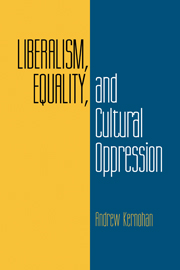1 - Equality, Tolerance, and Cultural Oppression
Published online by Cambridge University Press: 11 January 2010
Summary
Liberalism is the dominant political ideology in North America and Western Europe. Liberalism is not a unified doctrine; its proponents range from Scandinavian social democrats to American libertarian capitalists. All varieties of liberalism, however, share a commitment both to the equal moral worth of persons and to the tolerance of diverse points of view on how lives should be lived. Liberalism originated in seventeenth- and eighteenth-century struggles against the aristocratic state and its established church. So one of its original tasks was to defend equality by arguing for the equal moral worth of the members of all social groups, both aristocrats and commoners. Its other important task was to defend tolerance by giving a theoretical account of how diverse religious views, both established and nonconformist, could coexist in one state. By failing to contest cultural oppression, I shall argue, contemporary liberalism has overemphasized tolerance at the expense of equality.
LIBERALISM, EQUALITY, AND TOLERANCE
Tolerance has remained a major feature of twentieth-century liberalism in both its libertarian and egalitarian variants. Tolerance for competing versions of the good life distinguishes libertarians from Christian fundamentalists, however much they may agree on government economic policy. And a commitment to tolerance distinguishes liberal egalitarians from the socialist egalitarians of the old USSR. Recent liberal writing incorporates tolerance through the principle of state neutrality. Dworkin defines neutrality like this:
Liberalism commands tolerance; it commands, for example, that political decisions about what citizens should be forced to do or prevented from doing must be made on grounds that are neutral among the competing convictions about good and bad lives that different members of the community might hold.
- Type
- Chapter
- Information
- Liberalism, Equality, and Cultural Oppression , pp. 1 - 25Publisher: Cambridge University PressPrint publication year: 1998



